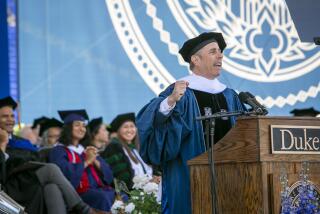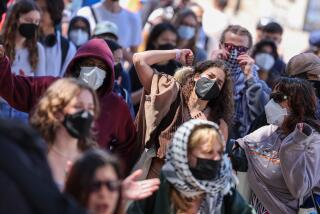Anti-Bush Protests Fizzle in Korea : Effigy Is Burned but Public Shows Little Support for Dissenters
- Share via
SEOUL — Some students burned him in effigy, opposition leaders warned him about rising anti-Americanism and a dozen lawmakers boycotted his address before the National Assembly, but on the whole, President Bush received a positive reception Monday from South Koreans.
Widely anticipated street demonstrations did not materialize despite a call by the country’s largest dissident coalition, whose leaders were swiftly taken into police custody when they tried to carry out a tiny protest rally at noon near the American Embassy.
Angry students at Dongkuk University burned an effigy of Bush and chanted anti-American slogans before trading rocks and firebombs in an encounter with police at the campus gate.
20,000 Riot Police
Public support for the protests, however, was not in evidence. This may have had something to do with the nearly 20,000 riot police deployed in central Seoul, but random street interviews suggested that not many people shared the dissidents’ scorn for Bush or for the United States.
“I’m not sure why they’re protesting,” said Kim Hak Jin, 30, a shoe company employee, “but I’d like to protest their protests.”
Bush stopped in Seoul for an afternoon on his way home from Beijing and Tokyo.
Lee Kyu Bom, 54, owner of a small textile company, said he was left with a “good impression” after watching a live television broadcast of the President’s speech.
Bush delivered a tough message on free trade and reassured his hosts that the United States will continue to stand behind its security obligations in South Korea.
“It’s encouraging to hear he’s committed to not pulling out U.S. ground troops,” said Lee, interviewed amid squads of marching riot police in the downtown Myongdong shopping district. “I see a strengthening of U.S.-Korea relations, in spite of the anti-American rhetoric of the younger generation.”
Students and dissidents have issued strident demands for the withdrawal of the 43,000 U.S. troops stationed here, saying the American military presence obstructs the dialogue on reunification with North Korea. They also have allied themselves with militant farmers in opposing liberalization of South Korea’s restricted agricultural market.
Opposition leader Kim Dae Jung, among political party chiefs who conferred with the President after Bush’s meeting with President Roh Tae Woo, expressed concern about anti-American sentiments and faulted the United States for a “lack of sincerity” in resolving problems, such as the dispute over farm imports, the Korea Times reported.
“All these combine to help make youth turn its back on the United States,” Kim reportedly told Bush.
Universities are now in recess, which may explain why campus unrest was not prevalent Monday. It might also be true that the majority of students, like the general population, still has a soft spot for America.
“America has many faults, but it’s still our best ally,” said Park Jung Bai, a 21-year-old physics major. “Students have good reasons to protest, but we should keep our heads cool instead of getting so emotional. We could lose an old friend.”
More to Read
Sign up for Essential California
The most important California stories and recommendations in your inbox every morning.
You may occasionally receive promotional content from the Los Angeles Times.










